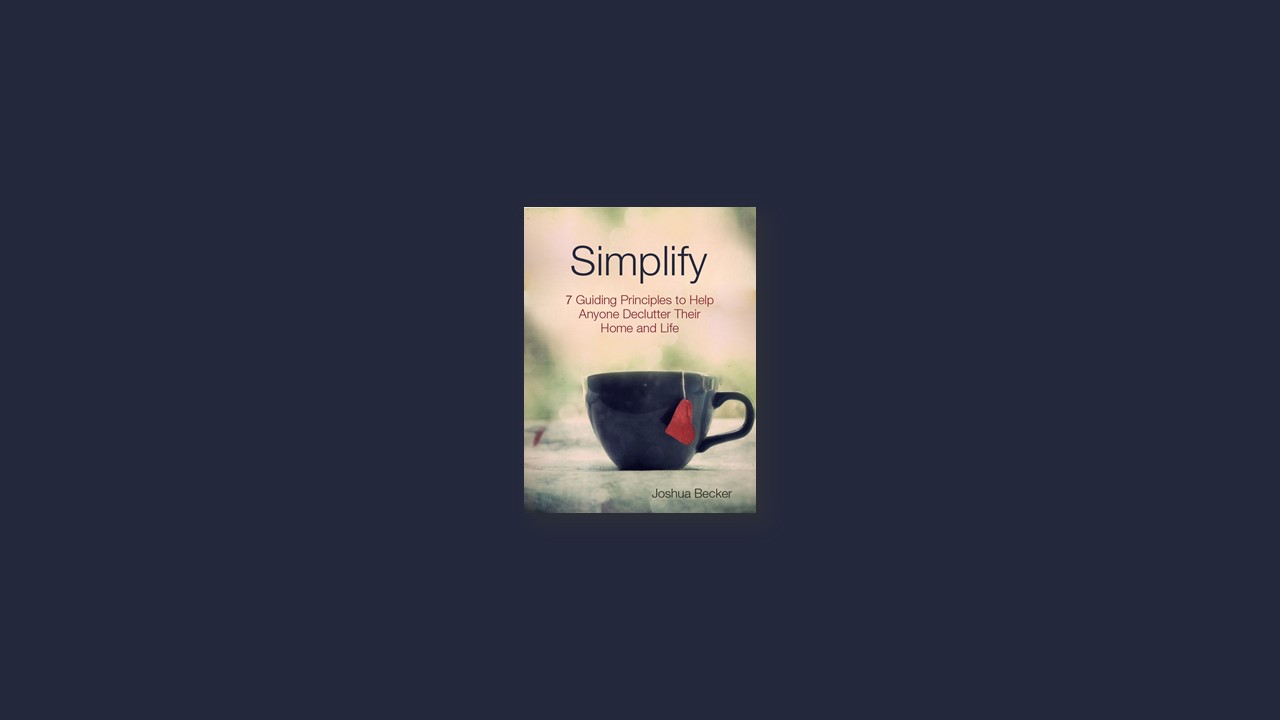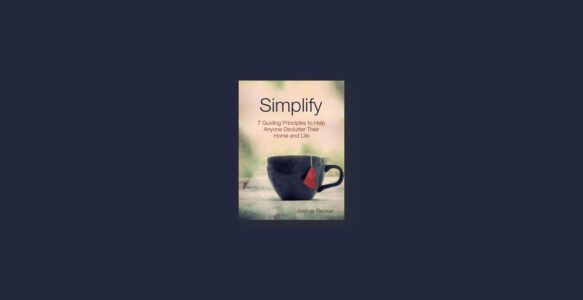PRINCIPLE #1: BE CONVINCED
Before any of us can simplify our homes and lives, we must be convinced that the lifestyle is worth our effort. To accomplish that task, here are ten benefits of living a minimal lifestyle:
- Spend less
- Stress less
- Easier to clean
- Freedom
- Good for the environment
- Be more productive
- Example for others
- Financially support other causes
- Own higher quality things
- Less work for others
PRINCIPLE #2: MAKE IT WORK FOR YOU
Minimalism is the intentional promotion of the things we most value and the removal of anything that distracts us from it.
Your particular practice of minimalism is going to look different from anyone else. It must! After all, you live a different life than anyone else. You may have a large family, small family, or no family. You may live on a farm, in a house, or in a studio apartment. You may collect antiques, stamps, or bottle caps. You may love music, movies, or books. You may cherish old photographs, family heirlooms, or romantic letters from a lover.
Find a style of minimalism that works for you. One that is not cumbersome, but freeing based on your values, desires, passions, and rational thinking. Be aware that your definition will not come overnight. It will take time. It will evolve – even change drastically as your life changes. It will require give and take. You will make a few mistakes along the way. And thus, it will also require humility.
PRINCIPLE #3: JUMP RIGHT IN
Have nothing in your houses that you do not know to be useful or believe to be beautiful. — William Morris
A general rule of thumb to guide you is, “If it isn’t essential, remove it.” With that in mind, here are a few quick tips to think about in each room of your house.
- Living Room / Dining Room – Make a commitment to keep only the decorations that mean the most to you. Too many knick-knacks and photos in one room distract you and your guests from the ones you hold most valuable.
- Bedrooms – Look to clear as many surfaces as possible. Keep your drawers and closets free from clutter by removing the items you no longer use.
- Wardrobe – A typical person wears 20% of their clothes 80% of the time. Try this experiment: turn around all of the hangers in your closet. After you wear an item, return it to the closet with its hanger facing the right direction. After 2-3 months, you will have an irrefutable, visual representation of the clothes you no longer wear. Donate them.
- Bathrooms/Linens – Someone once said, “You really only need two towels or sets of bed sheets. One to use while the other is being washed.” While minimizing down to only two towels may be a bit irrational, you can certainly find inspiration in the thought above to clear your closets of unused linens.
- Home Office – Paper clutter is a never-ending battle. You’ll need a filing system. And you’ll need the discipline to use it.
- Toy Room – Kids need to play. Kids need toys. They just don’t need quite so many. Include them in the purging process – as difficult as it may be at first, they will get used to it. Make sure every toy gets a home and every child knows where that home is.
- Kitchen – In the New York Times, Professional Chef, Mark Bittman wrote an article titled, “A No- Frills Kitchen Still Cooks” where he outfitted an entire kitchen for less than $300. Check out his comprehensive list to be reminded of how few gadgets we really need to cook.
- Storage Room – While some argue against the use of boxes in the storage room saying they discourage true purging, Joshua believes they can be helpful in storing things neatly. If you are nervous about the minimizing process, store items in a specially-marked box with the date clearly marked. After 3-4 months if you had no need for the item, perhaps you can function without it permanently.
PRINCIPLE #4: STOP THE TREND
“Fix your eyes not on what is seen, but on what is unseen. For what is seen is temporary, but what is unseen is eternal.”
Joshua wrote, “During the year I look forward to every paycheck and every bit of extra income. But when I sit down to fill out my tax forms, I cringe at every bit of extra income that I received during the year. In the same way, making a charitable donation can be a difficult check to write during the year, especially when money is tight. But, on April 15, I celebrate every charitable donation I made and often wish I had made more as each one slowly reduces my tax bill.”
Tax day and deathbed are two moments in life when everything gets flipped upside down. But there is one big difference between them: we’ll have to do our taxes again next year (unfortunately), but we only get one shot at this life (unfortunately). Live it for the things that matter by becoming a fan of the invisible, lasting things today.
PRINCIPLE #5: PERSEVERE
Not everything that can be counted counts and not everything that counts can be counted. — Albert Einstein
When you begin the decluttering process in your home, you will feel excited and energized. You will gain small victories and they will compel you to set even loftier goals. They will mold you, shape you, and motivate you. Then, you’ll finish.
And the difficult task of keeping your home clutter-free will set in. Your energy will no longer be set by the goal of decluttering one more room. Instead, you will learn to persevere. To help you persevere and keep your home clutter- free, here are 6 helpful hints:
- Recognize Your “Clutter Collection Sites.”
- Minimize Your Junk Mail
- Stay Ahead of the Game with Clothing.
- Stay Clutter-Free with Kids.
- Be Ready for the Holidays/Gifts.
- Think Outside the Box.
PRINCIPLE #6: SHARE THE JOY
An individual has not started living until he can rise above the narrow confines of his individualistic concerns to the broader concerns of all humanity.” – Martin Luther King, Jr.
Share the Joy by telling your story. You will find people are excited to try it themselves. They will cheer you on. They will motivate you by holding you accountable and ask you how things are going the next time you see them.
Here’s Christine’s Story… “One of the perks is that in my attempt to become more minimalist I’ve stopped shopping almost completely. I plan on wearing out the clothes/shoes I have before buying anything new. I don’t even think about shopping much at all anymore. My husband has really started getting into my new lifestyle choice – it’s great to have him on board!
I just think that it’s a great way to live. I carry less in my bag when I go places. I have fewer material things to worry about. I don’t feel “consumed with consumerism”. It’s liberating!”
PRINCIPLE #7: SIMPLIFY EVERYWHERE
You don’t need to chase everything you’ve always wanted if you already have everything you need.
Simplicity brings freedom. Simplicity brings joy. Simplicity brings balance. You will experience this freedom, joy, and balance as your home becomes simple and decluttered. Soon, you will begin to ask the question, “Where else in my life can I remove distraction and simply focus on the essential?
Simplifying your life can be more than just removing physical belongings. If minimalism is the intentional promotion of the things that I most value, it is also about deciding what is most important in my life and removing the things that distract me from it. It is about removing the urgent for the sake of the important.
The Story of The Fisherman
One day a fisherman was lying on a beautiful beach, with his fishing pole propped up in the sand and his solitary line cast out into the sparkling blue surf. He was enjoying the warmth of the afternoon sun and the prospect of catching a fish.
About that time, a businessman came walking down the beach, trying to relieve some of the stress of his workday. He noticed the fisherman sitting on the beach and decided to find out why this fisherman was fishing instead of working harder to make a living for himself and his family. “You aren’t going to catch many fish that way,” said the businessman. “You should be working rather than lying on the beach!”
The fisherman looked up at the businessman, smiled and replied, “And what will my reward be?”
“Well, you can get bigger nets and catch more fish!” was the businessman’s answer.
“And then what will my reward be?” asked the fisherman, still smiling.
The businessman replied, “You will make money and you’ll be able to buy a boat, which will then result in larger catches of fish!”
“And then what will my reward be?” asked the fisherman again.
The businessman was beginning to get a little irritated with the fisherman’s questions.
“You can buy a bigger boat, and hire some people to work for you!” he said.
“And then what will my reward be?” repeated the fisherman.
The businessman was getting angry. “Don’t you understand? You can build up a fleet of fishing boats, sail all over the world, and let all your employees catch fish for you!”
Once again the fisherman asked, “And then what will my reward be?”
The businessman was red with rage and shouted at the fisherman, “Don’t you understand that you can become so rich that you will never have to work for your living again! You can spend all the rest of your days sitting on this beach, looking at the sunset. You won’t have a care in the world!”
The fisherman, still smiling, looked up and said, “And what do you think I’m doing right now?”
The Invitation
There is a life of simplicity that is calling out to you. It is inviting you to live the life you were born to live, not the life your neighbor is trying to achieve. It is inviting you to value the things that you want to value, not the values of billboards and advertisements. It is inviting you to remove the distractions in your life that are keeping you from truly living.
And it’s been here the whole time.


